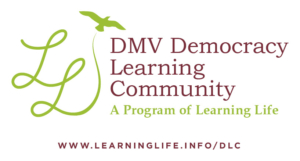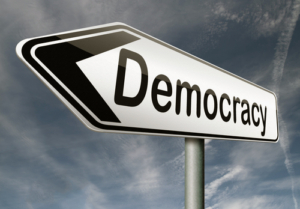Five Reasons to Support Democracy Festivals
This post was published on January 11 here in Democracy Chronicles. It is part of a Learning Life series helping to envision what a metro regional democracy learning community could look like. For the full list of articles, visit Learning Life’s DMV Democracy Learning Community page.
 In this perilous period for many democracies worldwide, different organizations are taking different approaches to strengthening democracy. Some organizations are rightfully focused on changing government, from campaign finance reform, to state transparency and access, to election protection. Others focus on citizens, including how to reduce polarization and get Americans to talk with each other across lines of difference in productive, civil ways. Learning Life focuses on citizens not just to facilitate civil dialogue, but wider cultural and lifestyle changes. In particular, we are developing ways to make democracy more fun and social, rather than boring and fractious, which is how too many Americans currently see democracy. Accordingly, here are five reasons why American governments (from local school boards to federal agencies), interested businesses and civil society organizations need to work together to support and organize more democracy festivals.
In this perilous period for many democracies worldwide, different organizations are taking different approaches to strengthening democracy. Some organizations are rightfully focused on changing government, from campaign finance reform, to state transparency and access, to election protection. Others focus on citizens, including how to reduce polarization and get Americans to talk with each other across lines of difference in productive, civil ways. Learning Life focuses on citizens not just to facilitate civil dialogue, but wider cultural and lifestyle changes. In particular, we are developing ways to make democracy more fun and social, rather than boring and fractious, which is how too many Americans currently see democracy. Accordingly, here are five reasons why American governments (from local school boards to federal agencies), interested businesses and civil society organizations need to work together to support and organize more democracy festivals.
1. Festivals Can Make Democracy More Fun
In the mid to late 1800s, American democracy was often highly participatory and fun, involving parades, rallies, music, public speeches and debates, culminating in elections with some of the highest voter turnout in U.S. history. Democracy then was also conflictual, corrupt and exclusionary (e.g., women and people of color were often or always barred from participating), so progressive reformers gradually remade American politics into what it is now: relatively orderly, peaceful, inclusive, yet also less fun. Can Americans make democracy fun again, without spurring conflict, corruption and exclusion? We at Learning Life think so, and democracy festivals can become a commonplace vehicle for making democracy fun again. We’re not alone in thinking so either; democracy festivals are spreading in Europe.
2. Festivals Can Widen Citizen Participation
Polarization may be a current focus of concern about democracy in the United States, but it has ebbed and flowed in intensity in American history. In contrast, another serious problem, unequal participation in politics — from reading, watching and discussing news, to voting and campaigning, to serving on school boards and city commissions up to federal office — is so perennial it is too often taken for granted, overlooked rather than tackled, despite its adverse impact on democracy. Namely, low participation among young people and those with less education and income means politics tends to skew in favor of others who participate more, namely older, more educated and wealthy citizens. That is not inevitable, but it is longstanding.
When done right, festivals can consciously engage precisely those less likely t0 participate. To do so entails leaning into the festival concept: there can certainly be talk-centric, conference-like speeches, panel discussions and debates for adults who want that, but there should also be democracy-related arts performances, games, interactive displays, and fun, hands-on workshops that appeal to diverse youth and families.
3. Festivals Can Bring Diverse People Together
Like all human beings, Americans tend to socially self-segregate into like-minded groups. This reduces our exposure to difference, despite the need in modern nations for citizens to be able to understand, interact and/or collaborate with diverse people at work, on the street, online, in community groups, and in government.
Precisely because festivals are fun, they can bring together people from diverse walks of life. However, whether those diverse people interact or stay in their small circles of friends and family depends on whether the festival activities call on participants to interact meaningfully with each other. Civic games, speed networking, citizen assemblies, small group dialogues, markets, and other activities, when carefully curated, can foster that needed interaction in civil, impactful ways, and even build enduring relationships across lines of difference.
4. Festivals Can Foster Cooperation
Cooperation is critically important for democracy. All levels of government tend to work better when they cooperate with businesses and/or civil society organizations to meet public needs, and address public problems, from truancy and poverty, to disease and climate change. Likewise, civil society groups that collaborate rather than work alone can learn more and do more to address any number of needs or problems. Further, within what can be called the democracy sector, greater interaction and cooperation between local, state and federal, or domestic and international democracy organizations can advance their respective aims.
they cooperate with businesses and/or civil society organizations to meet public needs, and address public problems, from truancy and poverty, to disease and climate change. Likewise, civil society groups that collaborate rather than work alone can learn more and do more to address any number of needs or problems. Further, within what can be called the democracy sector, greater interaction and cooperation between local, state and federal, or domestic and international democracy organizations can advance their respective aims.
Festivals can foster that cooperation especially when organizers invite different stakeholders to take part, or collaborate in putting on festival activities. Schools, nonprofits and city, county and/or state governments can cooperate to engage high school students in festival citizen assemblies through which youth learn about and help inform local policy-making on issues from school dropout or bullying to housing, employment, community service, or environmental protection. Artists, teachers and students can work together to put on democracy theater and dance performances, or painting and photography exhibits. Domestic and international democracy organizations can co-organize discussions or workshops on local-to-global democracy problems and solutions. Whether held every six months, year or two years, festivals can thus develop democracy by starting, strengthening, or sustaining varied collaborations.
5. Festivals Can Help Democracy-Related Businesses Make Money
Business can be, and frequently is a corrupting or skewing influence on democracy, especially in the United States, where monied interests are generally allowed freer rein to tilt elections and shape policymaking in their favor. However, as this Learning Life article indicates, business can also be a force for democracy in various ways. Festivals can also help public-facing, democracy-related companies — sellers of civic games, election apps, political and history books and memorabilia, etc., as well as cooperatively-run businesses — gain public attention and support by providing a marketplace where festival goers can, in one place, learn about, form relationships with, and purchase the goods and services of varied democracy sector businesses. In so doing, festivals can support local economies and businesses that fuel democracy.
For all these reasons, we at Learning Life believe festivals should play an important role in building engaging regional Democracy Learning Communities (DLCs).
Paul Lachelier, Ph.D.
Founder & Director, Learning Life

